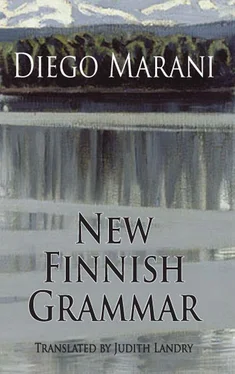It’s a lovely summer’s evening. The sun is sinking into the sea, lighting up the trunks of the trees, catching the buds of new resin on their bark, making the streamlets glitter. There was a time when this landscape would have gladdened my heart; I would have run down to the bright shore, to the waves of our own sea, unthreatening as a lake. But today this brightness holds no joy for me, and the long shadows on the meadows put me in mind of crosses. Death is all around me, and something within me, too, is dying: the affection that I felt for you, the faith I had in you. Now that their place is empty, I see how big it was. Like a bomb crater, it will fill up with water and with mud; but time will make the grass grow even there and, before long, the coots will nest there too. You, Sampo, are a plunderer of time, but I allow time to grow, and thrive.
Goodbye,
Ilma
Ilma’s last letter arrived yesterday, together with the news of the fall of Viiipuri. This one too I read under the tree of happy memories, and now it’s with the others in my jacket pocket. Once again, I did not understand it all, though I could not fail to see that it contained harsh words. It had clearly been written in a hurry, and I had difficulty copying it out. The steady, rounded hand to which I was accustomed had given way to one that was flatter, less legible. The margins were no longer neatly aligned, with the syllables conveniently marked off; now the words were twisted and choked, as though the writer had not had the time or indeed the inclination to make them comprehensible, and there were crossings out and blank spaces. Even the letters of my name on the envelope might have been written by a different hand; reading them was like hearing myself summoned by an unknown person. But nothing matters any more after what happened today at Katajanokka.
Ilma was right in saying that everything is bearable until it kills us. Man’s struggle against pain is a war where each of the two sides has its own rightful role. The winner acknowledges the dignity of the defeated, even when it is a death sentence. But my war was of another kind; it was a war in which I was my own enemy. And now I have lost it. To spare myself would have made no sense; there are no prisoners in this kind of challenge.
For days now, the city has been sweltering under a sultry cloak of haze. The air is heavy, dust-laden, full of animal smells; the sea gives out a bitter smell of rotten seaweed. As they cross the bay to reach the market, the fishing boats create waves which linger on behind them, slow to close up. Night and day follow one another under the same uncaring, leaden sky, whiter where the sun is; even at night it carries on glowing, like embers buried under ash. Beneath this stagnant air, the city barely moves; it trembles slightly as the trams pass, like the faded scenery of some old theatre. Houses and blocks of flats seem on the point of crumbling away, as though some imperceptible underground explosion had silently snapped the iron framework of their reinforcements.
Last night a land wind brought cool air, and this morning clouds streaked with violet massed above the city, shutting out the horizon from all sides. After my stint in the laundry, I had gone down to the port to enjoy the freshness, and walked as far as the point at Katajanokka. There was a lot of coming and going in the harbour at Pohjoissatama. A train was worming its way along the shore, where a big old rusty merchantman was moored. Beside me, a group of sailors seated on the ballast were watching the ships as they passed in front of the wharf, and the plumes of smoke from vessels further out to sea. A gunboat was coming out of the port, probably on its way to the Isthmus; it was heading in our direction, cleaving the water powerfully as it went, sending up wings of foam. Black in the black water, all flags flying, it was a daunting sight; we could see the sailors running busily to and fro on the deck. Now it was passing right in front of us, an imposing hulk of riveted sheet metal, bristling with cannon, teeming with shouting sailors. Two whistles from its siren threw the whole bay into a state of alert. One of the sailors on the ballast pointed to it, saying:
‘That’s German goods! It arrived here from Danzig in 1943, Walhalla, it’s called. We repainted it ourselves in the shipyards at Suomenlinna!’
I too watched the ship as it sailed by, the blue cross snapping in the wind to the stern, smoke pouring from the smoke stack, adding further grey to the dull sky. Behind the city darker clouds were now rising, swollen with rain. The sailors who’d been sitting beside me on the ballast were now walking away, caps in their hands, down along the side of the hill. Even when they had disappeared from sight, I could still hear snatches of what they were saying, as though from another world. Now I was quite alone on Katajanokka Point, and fate was preparing its show for me alone.
I was gripped by a sudden, almost physical sense of unease; it was as though my mind had not yet received the message which my eyes had sent it. My face to the wind, I carried on looking at the ship, more because it happened to be before my eyes than out of any genuine curiosity. It was then, and only then, that I saw the large white rust-streaked letters on its towering hull: ‘Sampo Karjalainen’. I have no words to describe the sensation that came over me: rather than surprise, or disbelief, my predominant feeling was one of fear: at first it felt like a blow, a sudden lash to the defenceless brain, then, like a poison, it slowly seeped into every vein in my body. I let out a cry; but even a thousand cries would not have been enough. A cruel God has fashioned us in such a way that pain never bursts out all at one time, tearing us limb from limb; filters in mind and body intervene to slow the process down, to make us fully present at our suffering, so that we may sound out each portion of ourselves as it goes into agony, gasping and wheezing and powerless to die. That was what I experienced that morning on Katajanokka Point, nailed to the spot by that sight, my mind darkened by a maelstrom of thought. So that was it: that name, which I had always believed to be my own, written on the discoloured label of my seaman’s jacket, was nothing other than the name of a warship. Thinking back to what the sailor had said, I realised why no one had ever linked my name with that of the warship ‘Sampo Karjalainen’; it had not long been part of the Finnish navy. So no one had heard of it, and there was no knowing where it had previously been operating. So, did my jacket belong to one of the sailors on the warship? Indeed, was I one of them? And how had I landed up in Trieste? Or had I got hold of that jacket in some other way? So, who was I? What about the monogram on the handkerchief? What did those letters mean? They could not refer to the name of the ship. Whose initials were they? That volley of unanswerable questions toppled my certainties like bowling pins. The identity I had built up for myself with so much difficulty crumbled away in an instant, was blown sky-high by that explosion of white letters rising from the sea like a shout, an insult, a jeer. The warship ‘Sampo Karjalainen’ slipped slowly out towards the open sea, taking my name with it. Trieste, the Tübingen, Doctor Friari, Stettin, the Ostrobothnia, Ilma, Koskela, they were all whirling around in the kaleidoscope of my mind, turning every image into so many unfamiliar fragments. I was not Sampo Karjalainen, perhaps I was not even Finnish; now, I was no one at all.
Paradoxically, this discovery — which in fact was taking me nearer to the truth — had the effect of utterly weakening my resolve. I no longer had the strength to search, to try to stay afloat. I was seized by an irresistible urge to let myself founder, to disappear into the innermost recesses of my twisted mind. It no longer made sense to carry on seeking my real name, my real past. Eventually, I had indeed become Sampo Karjalainen, but not the one I dreamed of, with a house, a past, a family awaiting him. I was a non-existent man, invented by a label on a seaman’s jacket, a huge misunderstanding which had taken on life through a cruel coincidence of accidents of which I was unaware. No shadow of uncertainty any longer lay between me and a tragic fate which I could not avoid. Such knowledge as I had, believing that I could legitimately claim it as my own, might after all have nothing to do with my true story, with my true name. Just a short time ago, I had believed that my real past was at my fingertips as I walked the streets of Helsinki, had dreamed that I would sooner or later take complete possession of it; now it was disappearing before my very eyes, sucked away by that whirlpool of unquestionable truth. Because now I knew it: that was the truth.
Читать дальше












